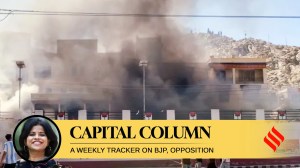Ministry favours merger of MRL with IOC
NEW DELHI, APRIL 12: The petroleum ministry has favoured merger of Madras Refinery (MRL) with Indian Oil Corporation (IOC) while acceptin...

NEW DELHI, APRIL 12: The petroleum ministry has favoured merger of Madras Refinery (MRL) with Indian Oil Corporation (IOC) while accepting Nitish Sengupta committee’s other recommendations on restructuring of the oil sector.
The ministry has circulated a cabinet note on mergers of stand alone refineries with oil marketing companies to prepare them for deregulated oil market in India from the year 2002, highly placed ministerial sources said today.
The Sengupta committee had suggested that Bharat Petroleum (BPCL) buy up the entire government equity in Cochin Refineries (CRL) besides MRL’s tie up with both IOC and BPCL.
The sources said the ministry had accepted the entire recommendations of the committee but with certain modifications and the final decision on the issue was left for the cabinet.
National oil companies had strongly protested against the recommendations of the committee, with IOC conveying to the petroleum ministry that it already had marketing tie-ups with CRL, MRL and BongaigaonRefineries (BRPL).
On the other hand officers’ association of the CRL has written to the Union government protesting against proposed merger of the refinery with BPCL. The committee had also recommended that government should consider creation of `umbrella of holding company’ to combine the strength of Hindustan Petroleum, BPCL, IBP along with stand alone refineries CRL, MRL and Numaligarh Refinery (NRL) that would be "equal in size to IOC."
The holding company concept should be explored only after the implementation of other recommendations, the committee had said in its report submitted to government last month.
The committee was asked to suggest ways for survival of stand-alone refineries and marketing companies in the de-regulated era while ensuring that there were no supply disruptions.
When contacted IOC chairman M A Pathan said that he had asked the government to allow the corporation to continue with its existing marketing arrangements with three stand-alone refineries for a period rangingfrom five to ten years. "We have conveyed our views on the Nitish Sengupta report and it is for the government to take a view," he said.
IOC has also asked the government to give it the option of buying some of these refineries in case a decision was taken for disinvestment of government equity in these companies, he said. While recommending that IOC should buy the entire equity in BRPL, the committee had said BPC should be considered as a co-partner for tie up with MRL.
This should be done after allowing Bharat Petroleum `sufficient time’ to stabilise after its takeover of CRL and demonstration of its ability to do so without affecting the supply line and its recommended investment in stand-alone marketing company IBP, committee said.
Stating that IBP needed a strong strategic partner for continued supply of products, providing marketing back-up and necessary financial support, the committee recommended that BPC should be allowed to buy over 26 per cent of government equity in it as permissible undertakeover guidelines. "If SEBI guidelines stand in the way of one shot of acquisition of this block of shareholding by BPC, this may have to be done in phases or a portion of the shareholding now held by financial institutions may have to be transferred to BPC," it said.
The committee said that IBP be continued as a separate corporate entity for the time being, but it be assured of the required products from Mathura/Panipat refineries of IOC in north and MRL and CRL in the south through appropriate marketing tie-ups for at least five years.
It also recommended creation of an independent regulator authority for the oil sector in place of existing Oil Coordination Committee (OCC), an extension of petroleum ministry, to regulate the supply of products and handle critical issues during the transition period of deregulation.
National oil companies had earlier this month conveyed their opposition to the petroleum ministry against the Sengupta committee recommendation that all existing pipelines, excludingstrategic ones owned by IOC, should be transferred to an independent company.





- 01
- 02
- 03
- 04
- 05


























